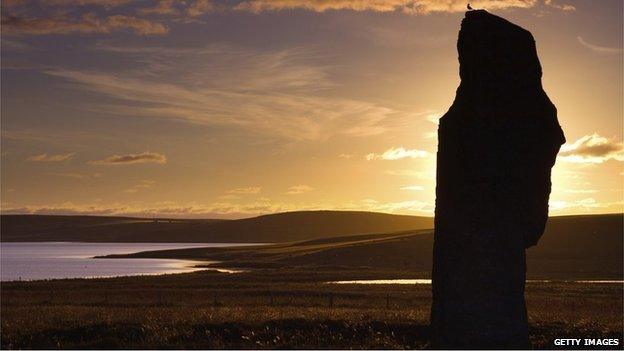Scottish independence: UK government sets out island powers proposals
- Published

The proposals would affect Orkney, as well as Shetland and the Western Isles
The UK government has set out its plans to increase representation for Scotland's islands if there is a "No" vote in the referendum.
It said legislation would be scrutinised to ensure it takes account of island priorities.
The Scotland Office would have a dedicated islands representative and an oil and gas islands forum would assist decision-making in the sector.
The Scottish government outlined its own proposals in June.
The UK government said it had also committed to establish renewable energy transmission links to the islands.
Island-specific challenges for transport, postal services, digital connectivity and fuel poverty will receive closer consideration, and measures will be taken to strengthen the transparency and accountability of the Crown Estate, which manages Scotland's seas and foreshore.
There will also be a dedicated point of contact within the UK's representation to the EU.
Scottish Secretary Alistair Carmichael said the proposals would "strengthen the voice of our islands at the heart of government".
He added: "It will mean their unique needs are considered across all UK government activity and legislation, tailoring our approach to ensure islands issues continue to get the attention they require.
"That is good news for the councils and for the whole country and will improve the economy, connectivity and lives of people on our islands. It shows we are not only listening, but acting - and in doing so we are strengthening Scotland and its place in the UK."
Council leaders in Orkney, Shetland and the Western Isles have been campaigning for local government to be given more control over island affairs in a campaign entitled Our Islands Our Future.
Island's Bill
Angus Campbell, leader of Comhairle nan Eilean Siar, welcomed the UK government's response to the campaign.
He added: "I am confident that as we approach the referendum, the island groups are in a much stronger position now with both the UK and Scottish governments than we were prior to the launch of Our Islands Our Future."
Steven Heddle, convener of Orkney Islands Council, said: "Our intention throughout has been to secure a stronger future for our communities, regardless of the outcome of the referendum. I welcome this response to our representations."
Gary Robinson, leader of Shetland Islands Council, said the statement "represents another important output from our campaign".
In its Empowering Scotland's Island Communities, external document, which was published in June, the Scottish government pledged to bring forward an Island's Bill in the event of independence.
'Unique needs'
Among the measures in the bill would be a commitment to ensure island communities get all money generated from leasing the seabed in the event of independence.
Islanders would also be given a stronger voice in Europe, and a new post of minister for island communities would be created.
Scottish Local Government Minister Derek Mackay said: "It is only with independence that the unique needs of islands can be recognised in a written constitution or that we will have the opportunity to ensure all island communities receive the net income from the adjacent inshore seabed, which currently passes through the Crown Estate to the Treasury.
"The income could be used for a variety of projects ranging from harbour improvements to community tourism projects and individual councils will be responsible for administering their own fund, including determining how funds are spent, who will benefit and the level of benefit required.
"Our islands have huge potential in energy, tourism and life sciences, and we are determined to work with them to unleash that potential with the powers of independence, and honour the principles of subsidiarity and local decision-making that are at the heart of the Lerwick Declaration."